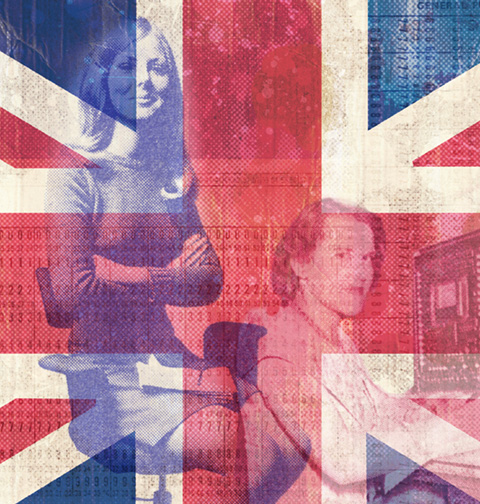
The Fall of a Technology Empire
The tech bubble of the 1990s had not yet burst when Marie Hicks graduated from Harvard University and began working as a system administrator. There, she made an observation that would eventually become the impetus for her critically acclaimed book, Programmed Inequality: How Britain Discarded Women Technologists and Lost Its Edge in Computing, published by MIT Press earlier this year. Although most of Hicks’s co-workers were male, all the supervisors were female—and from a different generation.
“Our bosses would tell us, ‘You don’t understand: Progress isn’t linear...there used to be more women in the field,’” says Hicks, now an assistant professor of history at Illinois Tech, whose course Women in Computing History is a first for the university. “It made me wonder why that gendered labor flip occurred.”
Hicks’s dissertation at Duke University, and later her book, explored how labor feminization and gendered technocracy caused Britain to go from being a world leader in computing to having a nearly extinct computer industry by the 1970s.
Hicks decided against focusing on the computing industry in the United States, despite its own rich history of both advancement and—sadly—discrimination. “Sometimes we learn more by going outside our comfort zone and out of the U.S. context and looking at what other nations have experienced,” says Hicks.
Britain’s computer workforce consisted of women who carried out the daily operating, input, and programming work required to make government and industry run. Although today the importance of programming is understood, in computing’s early days everything from punching to programming was viewed as low skill, and therefore considered “women’s work.” Hicks explains that this discriminatory mindset was one of both gender and class.
“The idea was that working with these machines in this technical way wasn’t intellectual, that it didn’t require that much brain power,” she says. Even the lowest-level workers, who punched data on cards, needed higher levels of education and skill than their employers imagined. Yet, they were paid little and treated poorly. When an eventual strike over their working conditions nearly shut down the British government, leaders began to more fully realize the importance of these jobs.
At the same time, programming was also becoming recognized as high-level skilled work. “As computing rose in status, the work wasn’t changing, but women were getting pushed out of the field because of the belief that it was now important enough for men to do,” says Hicks.
By the 1960s and 1970s, the jobs were becoming male-identified and computing experienced a gender flip. Hicks explains that despite similar discriminatory practices, Britain’s computing industry was “a huge failure story” compared to that of the United States because the United Kingdom had a far smaller labor force to insulate it from the results of its bad decisions. The United States, however, was still negatively affected by discrimination.
“You see this in Margot Shetterly’s book Hidden Figures,” says Hicks, noting that Shetterly endorsed Programmed Inequality. “If the U.S. had allowed all of the incredible black women who were so important to NASA’s success to work to their full potential, we may well have been able to do better than eke out a late win in the space race. Think of all the many black women and men who never even got the chance to contribute because they could not work in their chosen fields.”
Hicks sees the U.S. as being just steps behind the U.K. historically and hopes that her book can provide a cautionary tale for the computing industry.
“I make a big point in the book about how discrimination wrecks economies. Britain and its waning empire—we’re kind of a redux. It would be smart for us to look at the similarities,” she says.
Hicks’s second book shifts focus to the transgender population in the U.K. in the 1950s through the 1970s and how large state systems, such as health care and welfare, form people’s identities. This happens not only by the way these systems will and won’t describe people on official documents, for example, but also by how those affected push back against discrimination.